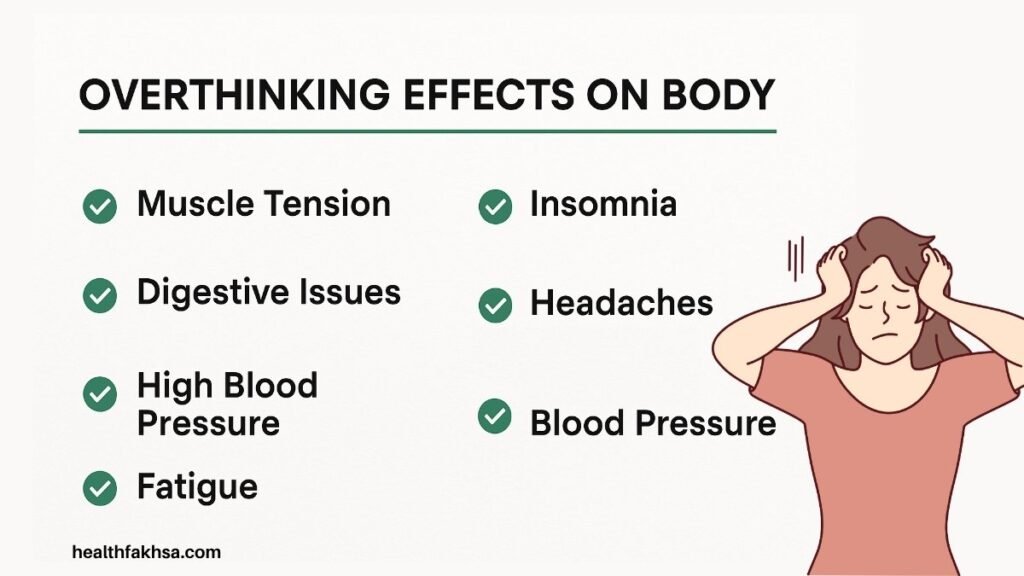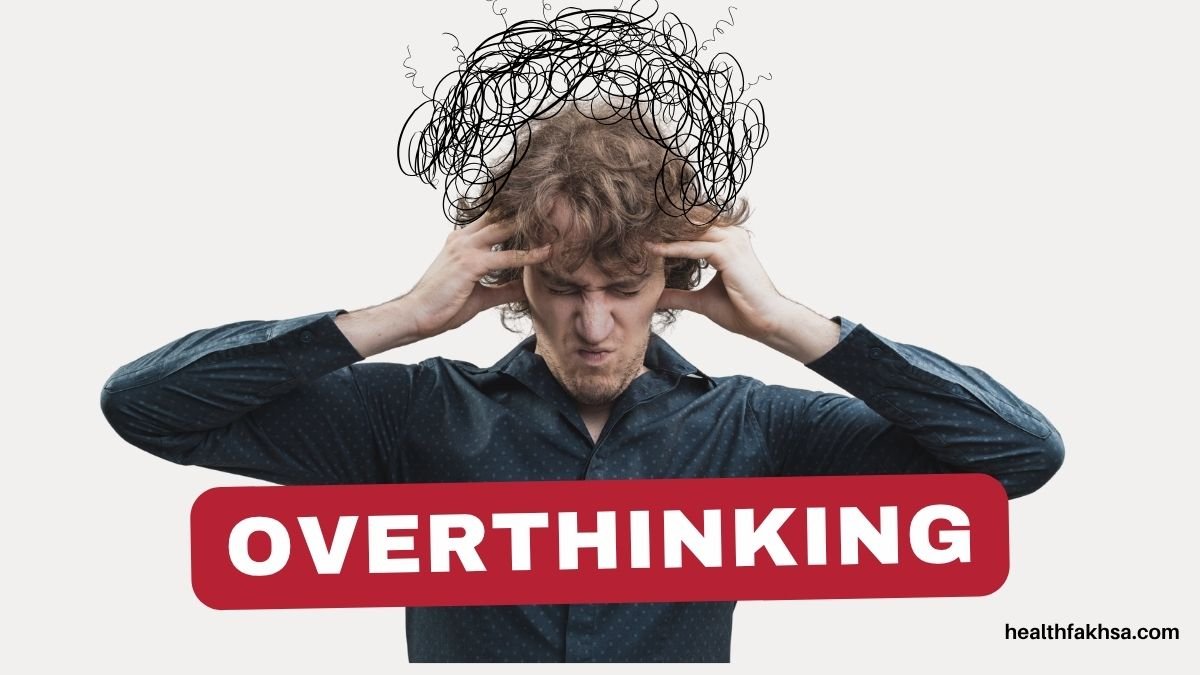Ever found yourself mentally replaying a conversation from days ago? Or running through every possible outcome of a situation before it even happens? If that sounds familiar, you’re not alone. Many of us identify as overthinkers, even if we don’t always realize the emotional and physical cost.
Let’s get real: overthinking doesn’t make you weak—it makes you human. But when it starts to consume your peace, sleep, and sense of clarity, it’s time to ask deeper questions. What is the overthinker definition? Is overthinking a mental illness? What are the actual effects of overthinking on the body? Can overthinking kill you? These are not just random curiosities—they’re questions people search late at night, hoping for relief.
If you’ve ever searched for synonyms for overthinking, you’ll find words like rumination, catastrophizing, and mental exhaustion. But no matter what you call it—whether it’s another word for overthinking or another term for overthinking—the experience is deeply real and often draining.
Another Word for Overthinking
Another word for overthinking is rumination — a psychological term that means continuously thinking about the same thoughts, often sad or dark in nature. It’s often associated with anxiety and depression.
Other casual alternatives:
- Overanalyzing
- Overprocessing
- Excessive thinking
Another Term for Overthinking
Another term for overthinking could be:
- Analysis paralysis – when you overthink so much that you can’t make a decision
- Mental overdrive – when your brain won’t slow down
- Cognitive overload – too much mental processing at once
Let’s explore what overthinking really is, how it affects your health, and what you can do to finally find relief.
Overthinker Definition – What Does It Really Mean?
In simple terms, an overthinker is someone who has a tendency to dwell, ruminate, and analyze excessively—often beyond what’s helpful. But that doesn’t mean you’re “crazy.” It often means your brain is trying too hard to protect you.
You might be an overthinker if you:
- Rehearse future conversations over and over
- Replay past mistakes in a mental loop
- Obsess over things out of your control
- Struggle to make even simple decisions
It’s a mental habit that feels like control—but actually leads to paralysis, anxiety, and burnout.
What Causes Overthinking?
Overthinking is often caused by anxiety, fear of failure, past trauma, or a deep need for control. When the brain doesn’t feel safe or certain, it tries to “solve” everything by running endless mental scenarios. This can be triggered by:
- Stressful life events (breakups, job changes, etc.)
- Perfectionism or fear of making the wrong choice
- Childhood experiences (e.g., harsh criticism or instability)
- High sensitivity or an anxious personality type
It’s your mind’s way of trying to protect you—but it can end up doing the opposite.
Is Overthinking a Mental Illness—or Just a Habit?
Let’s clear this up: overthinking by itself is not classified as a mental illness. However, it’s often a symptom or pattern seen in conditions such as:
- Generalized Anxiety Disorder (GAD)
- Depression
- Obsessive-Compulsive Disorder (OCD)
- PTSD or trauma-related disorders
Overthinking is your brain trying to “solve” discomfort. But instead of creating clarity, it creates confusion, fear, and emotional exhaustion.
If you find yourself trapped in your thoughts more often than not, it might be worth seeking professional support—not because you’re broken, but because you deserve peace.
Overthinking Effects on Body—What Stress Really Does to You

This is where things get real. Overthinking doesn’t just live in your head. It shows up in your body, slowly and silently:
- Muscle tension (especially shoulders and neck)
- Headaches and migraines
- Sleep issues (insomnia, restless nights)
- Stomach problems (bloating, IBS, nausea)
- Weakened immune system (you get sick more often)
- Fatigue that doesn’t go away with rest
Your body responds to mental stress like it’s in danger—even if you’re just stressing about a text message. That means your cortisol (stress hormone) rises, your heart races, and your digestion slows.
Over time, this wears you down, leaving you tired, wired, and emotionally unstable.
Can Overthinking Kill You? The Answer Isn’t Simple
It’s a heavy question, but one many secretly Google: can overthinking kill you?
Overthinking won’t “kill” you directly—but its long-term effects can lead to serious health problems if left unchecked:
- Chronic stress is linked to heart disease and high blood pressure
- Sleep deprivation increases risk for obesity, diabetes, and stroke
- Mental health decline can spiral into depression or suicidal ideation
The point here is not to scare you—but to wake you up to the real cost of not taking your thoughts seriously.
The good news? You can take your power back. You just need the right tools.
Signs You’re an Overthinker (And Don’t Even Know It)
Not all overthinkers look the same. Some are high achievers. Some are perfectionists. Some are simply sensitive souls.
Here are subtle signs:
- You overanalyze compliments or texts
- You rehearse what you’ll say before every social interaction
- You constantly doubt your choices—even minor ones
- You lay awake thinking about how your day could have gone better
- You need other people’s reassurance before making a decision
Sound familiar? Awareness is the first step to freedom.
How Do I Stop Overthinking—Tactics That Actually Help
Let’s move into solutions. Overthinking isn’t something you “snap out of.” But you can retrain your brain. Here’s how:
- Name the thought: Say it out loud or write it down. Naming reduces its power.
- Set a worry timer: Give yourself 10 mins a day to worry, then stop.
- Practice grounding: Focus on 5 things you can see, 4 you can touch, 3 you can hear…
- Do a brain dump: Write everything on your mind, then close the journal.
- Move your body: Walk, stretch, dance—just get out of your head.
- Challenge the thought: Is this fact or fear? Real or imagined?
Try just one tactic a day—consistency, not perfection, rewires your brain.
❓ Frequently Asked Questions About Overthinking
Is overthinking a mental illness?
No, overthinking isn’t classified as a mental illness on its own. However, it often shows up as a symptom in conditions like anxiety disorders, depression, or OCD. It becomes a concern when it disrupts daily life or causes chronic stress.
Can overthinking kill you?
Not directly—but chronic overthinking increases stress hormones like cortisol, which can raise your risk for heart disease, insomnia, and mental health decline. It’s the long-term impact that’s dangerous—not the thoughts alone.
What is the overthinker definition in psychology?
An overthinker is someone who engages in excessive rumination or analysis, often to the point where it interferes with decision-making, sleep, or emotional well-being. It’s a mental loop that feels productive but creates more stress.
Why does overthinking get worse at night?
At night, external distractions fade and your brain has space to wander. If your nervous system is still activated from the day, it can trigger a loop of racing thoughts, especially in people who tend to overanalyze or self-criticize.
How can I stop overthinking everything?
You can’t flip a switch—but small, consistent habits help:
- Use a “brain dump” journal before bed
- Practice mindful breathing
- Set limits on your worry time
- Talk to a therapist or mental health coach if it’s interfering with daily life
Bottom Line: Your Brain’s Not Broken—It’s Overwhelmed
If you’re reading this, you’re probably tired of thinking too much. Of feeling like your brain won’t shut off. Of knowing you’re smart, capable, and self-aware—but still stuck.
Here’s what no one tells you: Overthinking is not weakness. It’s overprotection.
Your brain is trying to keep you safe—from regret, embarrassment, failure. But in doing so, it’s keeping you stuck.
You don’t have to “cure” overthinking overnight. You just have to interrupt the pattern. Choose calm over control. Awareness over perfection.
And remember: the fact that you’re here, reading this, means you’re already doing the work.

